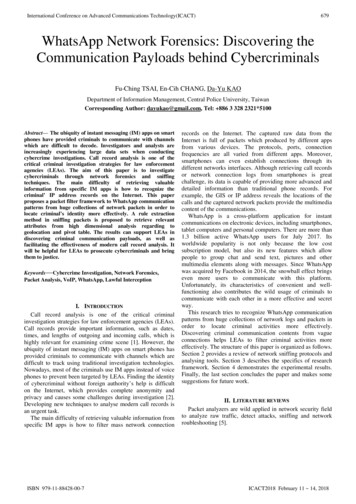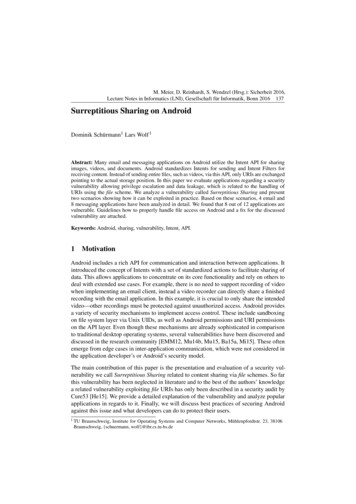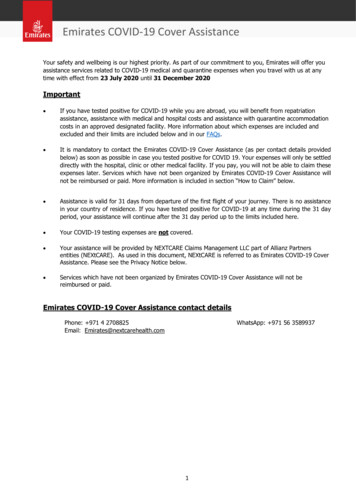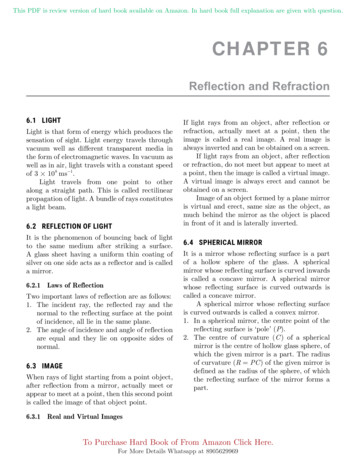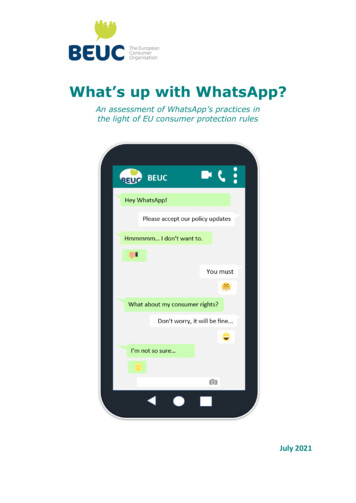
Transcription
What’s up with WhatsApp?An assessment of WhatsApp’s practices inthe light of EU consumer protection rulesJuly 2021
Table of contentsWhat this complaint is about 3The context .4 Relationships between WhatsApp and Facebook: always closer, always blurrier .4 The 2021 changes in WhatsApp’s policies . 5Problem #1 WhatsApp’s aggressive practices .6 What are the facts?. 6 What are the relevant legal grounds? . 8 Application to WhatsApp’s practices . 8Problem #2 Unclear and misleading changes in WhatsApp’s policies .12 What are the facts?. 12 What are the relevant legal grounds? . 13 Application to WhatsApp’s practices . 14Annex 1: Presentation of the changes in WhatsApp’s FAQ . 18Annex 2: Text of the notifications . 20Annex 3: Non-exhaustive list showing the recurrence of the notifications received by a WhatsApp userbetween end of May and early July 2021 . .212
What this complaint is aboutOn 12 July 2021, BEUC and eight of its member organisations1 submitted an external alertto the European Commission and the network of European consumer authorities (“CPCnetwork”) to report on several aggressive and misleading commercial practices by themessaging app WhatsApp, in accordance with EU Regulation 2017/2394 of 12 December2017 (“CPC Regulation”).According to our analysis, these practices constitute a widespread infringement with aUnion dimension of several EU consumer laws.Our complaint is based on EU consumer protection law only. However, it seems highlylikely that the practices of WhatsApp are not compliant with the EU General Data ProtectionRegulation (GDPR) neither. Therefore, we consider that the fact that the Hamburg dataprotection Commissioner found these practices and policies to be in breach of the GDPR2to be a relevant additional element for authorities when assessing the lawfulness ofWhatsApp’s commercial practices under consumer law.***APC (Romania), Consumentenbond (The Netherlands), dTest (Czech Republic), Forbrukerrådet (Norway), KEPKA(Greece), EKPIZO (Greece), S.O.S. Poprad (Slovakia) and UFC-Que choisir f/2021-05-11-press-release-facebook.pdf (last access: July 2021).13
The context1. ContextWhatsApp was launched in 2009 as a messaging app providing an alternative to SMS. Itis today available in more than 180 countries and in 60 different languages.With more than two billion active users, over five billion downloads, and more than 100billion messages sent every day, WhatsApp has become the world’s most popularmessaging app.3 It counts several million users in Europe, including approximately 48m inGermany, 35m in Italy, 33m in Spain, 30m in the United Kingdom, 4 21m in France,5 12.4min the Netherlands or 4.8m in Romania6.Over the years, WhatsApp has proposed new functionalities, such as voice calling, videocalling or group calls. It has also facilitated interactions between users and businesses. Inearly 2018, WhatsApp launched “WhatsApp Business” to facilitate contacts betweenbusinesses and their customers, and to enable them to showcase their products. Recently,WhatsApp announced its intent to become a key app for online shopping,7 and highlightedits objective to “build new ways to chat or shop with a business”.8As the Head of WhatsApp at Facebook Will Cathcart wrote on Twitter in January 2021:9“Not everyone may realise how common it is to WhatsApp message businesses inmany countries. In fact, about 175 million people message a business account eachday on WhatsApp and more want to do so”.10 Relationships between WhatsApp and Facebook: always closer, always blurrierFacebook bought WhatsApp in 2014 for an amount of 19bn.11In a blogpost written at that time, WhatsApp CEO Jan Koum announced that “WhatsAppwill remain autonomous and operate independently".12 He added “there would have beenno partnership between our two companies if we had to compromise on the core principlesthat will always define our company, our vision and our product." Facebook CEO MarkZuckerberg commented that "we are absolutely not going to change plans ics (last access: July cs/ (last access: July users-in-france (last access: July -users-in-romania (Last access: July 2021).7Payment via WhatsApp is already possible in certain countries (see: www.whatsapp.com/security/, last access:July -and-customer-service-on-whatsapp/?lang en (last accessJuly ks/whatsapp-facebook-data-sharing-3800374/ (last access: July 0772483104769, (last access: July cisions/m7217 20141003 20310 3962132 EN.pdf).12https://blog.whatsapp.com/facebook (last access: July 2021).344
WhatsApp and the way it uses user data. WhatsApp is going to operate completelyautonomously”.13Despite these early announcements, the alleged separation between WhatsApp andFacebook has become more and more porous over the years. Exchanges between the twocompanies have multiplied as Facebook has been seeking ways to maximise revenuesfrom its acquisition. From time-to-time, Facebook has been amending WhatsApp policiesto progressively facilitate the sharing of data between the two companies. In 2016,WhatsApp’s policy changes raised many concerns worldwide. When Facebook notified theEU of its acquisition of WhatsApp in 2014, it told the European Commission that it wouldnot be able to match users accounts on the two platforms. However, a few months later,this is exactly what Facebook did. Consequently, in 2017, the European Commission finedFacebook 110m for providing misleading information about the 2014 WhatsApptakeover.14 Furthermore, back in 2016, users still had (for a short period of time) thepossibility to opt out of sharing certain data with Facebook. However, this possibility wasnot clearly indicated to them,15 and was finally entirely removed in 2016.16 This meansthat WhatsApp users who did not opt out in 2016 and those who signed up since 2016share information (e.g. their phone numbers) with Facebook.Back in 2016, WhatsApp explained the increased coordination between WhatsApp andFacebook as follows:17“By coordinating more with Facebook, we'll be able to do things like track basicmetrics about how often people use our services and better fight spam onWhatsApp. And by connecting your phone number with Facebook's systems,Facebook can offer better friend suggestions and show you more relevant ads if youhave an account with them”. The 2021 changes in WhatsApp’s policiesIn January 2021, WhatsApp announced changes in its privacy policy and terms of service.Once again, this sparked worldwide criticisms and concerns, which forced Facebook andWhatsApp to re-think the whole process and to delay it for a few months.18 Finally,WhatsApp’s policy changes came into effect on 15 May 2021, globally but with some -watchingyou/?sh 7eae15017d0c (last access July P 17 1369 (last access July -handing-your-info-to-facebook/ (last access July 2021).16The Wired, “WhatsApp Has Shared Your Data with Facebook for Years, Actually”, January are-notification/ (last access: June 2021) (the followingpassage was deleted from the privacy policy: “if you are an existing user, you can choose not to have yourWhatsApp account information shared with Facebook to improve your Facebook ads and products experiences").This means that, in practice, users can no longer object to the sharing of data with FB.17https://blog.whatsapp.com/?page 5 (last access July 2021).18Burcu Kilic and Sophia Crabbe-Field, “You should be worried about how much info WhatsApp shares withFacebook”, The Guardian, 14 May 2021 res-with-facebook (last access July 2021).135
Annex 1 shows how WhatsApp has explained the main changes in its policies.19 Amongother things, WhatsApp has highlighted that there has been no change in the way it sharesdata with its parent company Facebook. As WhatsApp states, “we will not expandWhatsApp’s ability to share user data with its parent company Facebook users”. Inaddition, WhatsApp has been seeking to reassure its users by stating that their privatediscussions with (e.g.) friends and relatives will remain fully encrypted from end-to-end.However, as further explained below, there are still important changes for users, and theyare particularly relevant when users decide to engage with businesses. On this part,WhatsApp has failed to provide clear explanations about what the changes in the terms ofservice and privacy policy actually mean for users.Finally, although the changes may for now be limited to user-to-business discussions, onemay not rule out the possibility that Facebook will soon decide to make the same policyapplicable for all messages.20 Experience has shown that this would not be the first timethat Facebook breaks a promise.Problem #1. WhatsApp’s aggressive practices What are the facts?WhatsApp has been prompting its users to accept its policy changes through persistentnotifications (Annex 2 and 3) displaying the following statement:“The terms go into effect on 15 May 2021. Please accept these terms to continueusing WhatsApp after this date.”Initially, WhatsApp announced that users who do not accept the policy changes would loseaccess to their chats and other functions after a certain period of time. The exact timingof the functionality exclusion was said to vary from user to user.21 On its FAQ webpage,WhatsApp explained the consequences of not accepting the policy updates as ting-our-terms-and-privacy-policy-eea/?lang en (last access:July 2021).20As an Advisor for Internet Trust at Internet Society explained, “again, even if users believe that is safe, orthat it doesn’t apply to them, they may be looking down the road to the inevitable next steps from Facebook;switching from this being opt-in to opt-out, and extending the policy from B2C to all messages. There’s also thepoint that Facebook can intrude significantly on privacy without needing to read the contents of 800374/, last access: ivacy-policyupdates-take-effect (consulted on 2 June 2021).196
In early June 2021, after a lot of criticism, WhatsApp finally announced in its FAQ that ithad changed its approach: users who do not accept the policy updates will not experiencelimited functionalities on the app. WhatsApp also stated it “currently” had no plans for thereminders to become persistent. The updated FAQ displayed the following text:22“Considering the majority of users who have seen the update have accepted, we’llcontinue to display a notification in WhatsApp providing more information aboutthe update and reminding those who haven’t had a chance to do so to review andaccept. We currently have no plans for these reminders to become persistent andto limit the functionality of the app.”Nevertheless, at the time of writing this report (i.e., July 2021), WhatsApp continues tosend persistent notifications prompting users to accept the updated terms andprivacy policy. Since the beginning, these notifications have relentlessly put users underthe same pressure:“The terms go into effect on 15 May 2021. Please accept these terms to continueusing WhatsApp after this y-policyupdates-take-effect/?lang en (last access July 2021)227
What are the relevant legal grounds?Article 8 of the Unfair Commercial Practices Directive (UCPD):23 “A commercialpractice shall be regarded as aggressive if, in its factual context, taking account of all itsfeatures and circumstances, by harassment, coercion, including the use of physical force,or undue influence, it significantly impairs or is likely to significantly impair the averageconsumer's freedom of choice or conduct with regard to the product and thereby causeshim or is likely to cause him to take a transactional decision that he would not have takenotherwise”.Article 9 of the UCPD: “In determining whether a commercial practice uses harassment,coercion, including the use of physical force, or undue influence, account shall be takenof:(a) its timing, location, nature or persistence;(b) the use of threatening or abusive language or behaviour;(c) the exploitation by the trader of any specific misfortune or circumstance of such gravityas to impair the consumer's judgement, of which the trader is aware, to influence theconsumer's decision with regard to the product;(d) any onerous or disproportionate non-contractual barriers imposed by the trader wherea consumer wishes to exercise rights under the contract, including rights to terminate acontract or to switch to another product or another trader;(e) any threat to take any action that cannot legally be taken”.Point 26 of the UCPD Annex: “Making persistent and unwanted solicitations bytelephone, fax, e-mail or other remote media except in circumstances and to the extentjustified under national law ( )”.Point 24 of the UCPD Annex: “Creating the impression that the consumer cannot leavethe premises until a contract is formed”. Application to WhatsApp’s practices The use of undue influenceThe UCPD Guidance provides that an “aggressive practice should entail active conduct bythe trader (harassment, coercion or undue influence) which limits consumers’ freedom ofchoice”.24WhatsApp has been sending recurrent notifications to its users urging them to agree withthe new terms to continue using the service. The way notifications have been worded andthe message that they convey clearly infer that those users may lose access to theplatform (or to some functionalities of the service) if they do not agree with the policyEU Directive 2005/29/EC of 11 May 2005 (the Unfair Commercial Practices r-lex.europa.eu/legalcontent/EN/TXT/?uri CELEX%3A52016SC016323248
updates. This was confirmed by the earlier version of the FAQ, and also widely reported inthe media:“Instead of a hard cut-off, the messaging app will gradually degrade and eventuallycease to function if you don’t accept the changes.”Wired, 15 May 202125“WhatsApp users who don't accept the new terms after May 15 will eventuallyencounter "limited functionality" on the app until the updated terms are accepted”.Zd Net, 12 May 202126“A partir du 15 mai, les utilisateurs qui n’acceptent pas cette mise à jour subirontune utilisation dégradée de l’application de messagerie” [‘From 15 May, users whodo not accept this update will experience a downgraded messaging appexperience’]Le Monde, 12 May 202127Announcing that users may lose access to the service or experience limited functionalitiesis comparable to psychological blackmail and should be viewed as the digital version ofaggressive practice prohibited under Point 24 of the UCPD Annex (“creating the impressionthat the consumer cannot leave the premises until a contract is formed”). Although, intheory, users could decide to turn to other messaging apps, quitting WhatsApp would beat the expense of losing most of their contacts. For many people, leaving WhatsApp is notan option because of the strong network effects and the lack of interoperability with othermessaging services. For many, WhatsApp is the main channel for staying in touch withfamily and friends.In early June 2021, WhatsApp announced in its FAQ that it had currently “no plans forthese reminders to become persistent and to limit the functionality of the app”. The reasonfor this change, WhatsApp explained, was that “the majority of users who have seen theupdate have accepted”. In other words, this means that the majority of users whoaccepted the policy updates did so under the coercion that they would have facedlimited functionalities otherwise.In addition, as several screenshots taken between May and July 2021 show (and thusincluding after WhatsApp’s change in its FAQ) the message conveyed in the notificationshas remained the same and continues to read as follows: “the terms go into effect on 15May 2021. Please accept these terms to continue using WhatsApp after this date”. Thereis therefore a contradiction between what WhatsApp states in its amended FAQand the message that it continues to convey to its users in the notifications. Thisis all the more worrying considering that the majority of users will only read thetext of the notification appearing on their screens without taking the time toconsult the FAQ in cy-facebook-data-sharing/, 15 May 2021 (last access: July appens-if-you-dont-accept-our-new-privacy-terms/, 12 May2021 (last access: July efusez 6080031 4408996.html, 12 May 2021 (last access: July 2021)25269
To sum up: In early June 2021, WhatsApp announced that the “majority of users whohave seen the update have accepted”. This means that most of WhatsApp’susers had accepted the policy updates under the threat of experiencinglimited functionalities. Ultimately, WhatsApp announced a change in its FAQonce it had a large number of users who had bought in into the changes. Then, WhatsApp announced in its FAQ it had no plans to limit thefunctionalities but the message appearing in the notifications has continuedto be the same. It still provides that users must accept the updates tocontinue using the service by 15 May 2021. In addition, WhatsApp claimedthat the notifications will not be persistent, although they have beenrecurrent in practice. Finally, WhatsApp’s notifications continue to say, “accept by 15 May [2021]for continuing using the service”, but as of 8 July 2021, the date upon whichthis report was finalised, the platform is fully operational even for thoseusers who have not agreed with the policy updates. In other words,WhatsApp continues to trick people into accepting the policy updates withthe fear that they might lose access to the service. The nature, location, timing, and persistence of the notificationsoThe nature of the notificationsThe UCPD Guidelines stress that the prohibition of practices under Point 26 of the UCPD“aims to protect consumers against pestering by distance marketing tools”.However, this is what WhatsApp has been doing constantly.Users cannot use the service before either accepting the new terms by clicking on a big“accept” button or closing the notification window by clicking on a hardly visible tiny greyicon placed in the right corner of their screen.10
The design of the notification does not provide for a “no option”. This means that usershave no possibility to turn off the notifications and that WhatsApp will keep bothering themuntil they accept the policy updates. Similar practices of “no no option” have been reportedas dark patterns as they intend to push users into a certain direction and unduly limittheir freedom of choice.28oTheir timing & locationWhatsApp sends the notifications in a “pop up” window appearing on users’ screens whenthey open the app, which means in practice when they are about to answer or make phonecalls or when receiving/sending messages. In these circumstances, users will most of thetime simply agree with the update in order to quickly access the service to read or send amessage or call somebody.oTheir persistenceFinally, although WhatsApp announced that it had “currently” no intent to make thenotifications persistent, it continues to send notifications very frequently, often ona daily basis. A consumer reported to us that she received notifications (inter alia) on21, 27 May, 4, 7, 8, 9, 11, 12, 13, 14, 16, 19, 20, 21, 22, 23, 24,25, 28, 29, 30 June, 1,2, 4, 5, 6, 7 and 8 July 2021 (Annex am-no-option-for-no/ (see in particular Instagram’s “no optionfor no”) (last access: July 2021)29The notification received on 8 July 2021 was the last one to be included as the report was finalised on thatsame day.2811
To sum up: the content of the notifications, their nature, their timing and theirrecurrence put undue pressure on users and unfairly impair their freedom ofchoice. Such a practice is prohibited under Articles 8 and 9 of the UCDP.Problem #2 Unclear and misleading changes in WhatsApp’s policies What are the facts?In January 2021, a WhatsApp spokesperson announced:30“There are no changes to WhatsApp’s data-sharing practices in the European regionarising from the updated terms of service and privacy policy. For the avoidance ofany doubt, it is still the case that WhatsApp does not share European regionWhatsApp user data with Facebook for the purpose of Facebook using this data toimprove its products or advertisements.”In a series of tweets, WhatsApp’s Director of policy for Europe, Niamh Sweeney added:“The latest update to our Privacy Policy is about providing clearer, more detailedinformation to our users on how and why we use data. It’s also about improvinghow businesses use WhatsApp to connect with customers. The updated policyprovides info on how businesses using the WhatsApp API to talk to customers cannow do so using a Facebook-provided service to help them manage their chats withcustomers”.31In its FAQ and documentation, WhatsApp further highlighted:“The changes are related to optional business features on WhatsApp and providesfurther transparency about how we collect and use data”.And:“We have added more detail to certain sections of our privacy policy and addednew sections. We have also simplified the layout of the privacy policy and made iteasier to navigate” (Annex hfacebook-1.4452435 (last access: July 1347185269435469826 (last access: July 2021).3012
Source: WhatsApp FAQ (June 2021)32However, the concrete nature of the policy changes and their implications forusers remain far from clear. What are the relevant legal grounds?Article 5 of the Unfair Contract Terms Directive (UCTD):33 “In the case of contractswhere all or certain terms offered to the consumer are in writing, these terms must alwaysbe drafted in plain, intelligible language. Where there is doubt about the meaning of aterm, the interpretation most favourable to the consumer shall prevail ( )”.In the UCTD Guidance, the European Commission highlighted that, among the criteria tobe considered when assessing the potential unfairness of a term, is “the comprehensibilityof the individual terms, in light of the clarity of their wording and the specificity of theterminology used, as well as, where relevant, in conjunction with other contract terms”.34Article 5 of the UCPD: “A commercial practice shall be unfair if (a) it is contrary to therequirements of professional diligence, and (b) it materially distorts or is likely tomaterially distort the economic behaviour with regard to the product of the averageconsumer whom it reaches or to whom it is addressed, or of the average member of thegroup when a commercial practice is directed to a particular group of consumers”.Article 6 of the UCPD: “A commercial practice shall be regarded as misleading if itcontains false information and is therefore untruthful or in any way, including overallpresentation, deceives or is likely to deceive the average consumer, even if the informationis factually correct, in relation to one or more of the following elements, and in either casecauses or is likely to cause him to take a transactional decision that he would not havetaken otherwise: ( )b) the main characteristics of the product ( vacy-policy-update (last access in July 2021).33EU Directive 1993/13/EEC of 5 April 1993 (the Unfair Contract Terms x.europa.eu/legalcontent/EN/TXT/?uri uriserv:OJ.C .2019.323.01.0004.01.ENG&toc OJ:C:2019:323:TOC(lastaccess:July2021).3213
c) the extent of the trader's commitments, the motives for the commercial practice ( )” Application to WhatsApp’s practices WhatsApp does not explain in plain and intelligible language the nature of thechanges and their consequences for usersWhatsApp has argued that the policy changes do not modify the existing sharing of datawith Facebook, which has been in place since 2016. However, when looking more closely,the reality appears more complex.As explained earlier, WhatsApp pretends that the key objective of the changes for whichit seeks users’ acceptance is to make it easier for them to engage with businesses via theapp. While doing so, WhatsApp and Facebook are laying the ground for massive datatransfers between the two companies and the monetisation of the activity of WhatsAppusers, notably through marketing and advertising. This is however done in an obscure wayand is not intelligible for WhatsApp users. In its communication, WhatsApp misleads usersas to the true nature and objective of the policy changes, claiming that these serve toprovide more detailed information to users.WhatsApp’s FAQ highlights:35“Facebook hosting services: Messaging with businesses is different than messagingwith your family or friends. Some large businesses need to use hosting services tomanage their communication. Which is why we’re giving businesses the option touse secure hosting services from Facebook to manage WhatsApp chats with theircustomers, answer questions, and send helpful information like purchase receipts.But whether you communicate with a business by phone, email, or WhatsApp, itcan see what you’re saying and may use that information for its own marketingpurposes, which may include advertising on Facebook. To make sure you’reinformed, we clearly label conversations with businesses that are choosing to usehosting services from Facebook.WhatsApp’s Help Centre stresses:36“Shopping experiences: more people are shopping online, increasing as we areapart. Where available, businesses with a Shop on Facebook or Instagram canalready have Shops on the WhatsApp business’s profile. This allows you to see abusiness’s products on Facebook and Instagram and shop from it directly inWhatsApp. If you choose to interact with Shops, we will let you know in WhatsApphow your data is being shared with Facebook”.This means that when users talk to businesses on WhatsApp, their data is also beingtransferred to businesses and Facebook. Yet WhatsApp does not provide clear informationon the way the data is being shared with these third parties (and Facebook) when usersinteract with businesses via pps-privacypolicy/?lang en (last access: July ppsprivacy-policy-update/?lang fr (last access: July 2021).3514
WhatsApp argues:“The changes to our Privacy Policy provide you with more detail on how we manageyour information. We have added more detail to certain sections of our PrivacyPolicy and added new sections. We have also simplified the layout of the PrivacyPolicy and made it easier for users to navigate” (see Annex 1).Yet WhatsApp remains very vague about the sections it has removed and theones it has added. It is up to users to seek out this information by themselves.Ultimately, it is almost impossible for users to clearly understand what is newand what has been amended. The opacity of the new policies is in breach ofArticle 5 of the UCTD and is also a misleading and unfair practice prohibited underArticle 5 and 6 of the UCPD. Concerns about the unclarity and unfairness of the new policies arereinforced by GDPR infringementsThere is a lot of uncertainty and concerns about WhatsApp’s policy changes and what theyentail for users. On 11 May 2021, The Hamburg Commissioner for Data Protection rDatenschutzundInformationsfreiheit - HmbBfDI) issued an orde
Facebook has become more and more porous over the years. Exchanges between the two companies have multiplied as Facebook has been seeking ways to maximise revenues from its acquisition. From time-to-time, Facebook has been amending WhatsApp policies to progressively facilitate the sharing of

